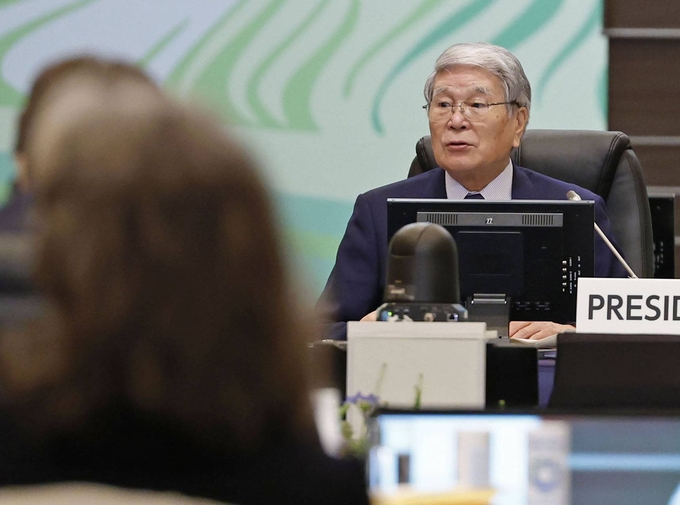May 21, 2025 | 03:43 GMT +7
May 21, 2025 | 03:43 GMT +7
Hotline: 0913.378.918
May 21, 2025 | 03:43 GMT +7
Hotline: 0913.378.918

Farm minister Tetsuro Nomura opens the Group of Seven agriculture ministers' summit in the city of Miyazaki on Saturday. Photo: Kyodo
During the gathering in the city of Miyazaki, one in a series of ministerial meetings taking place in the run-up to the G7 summit next month, Japan also plans to call on other group members to participate in a U.N.-involved project aimed at supporting small-scale food producers in developing countries.
"As food supply and demand change drastically around the world, agricultural policies in each country are at a historic turning point," farm minister Tetsuro Nomura said at the opening of the meeting.
The G7 groups Britain, Canada, France, Germany, Italy, Japan and the United States, plus the European Union.
The meeting is taking place as disruptions at food markets, brought on by the war between the two major grain suppliers, and the coronavirus pandemic, are pushing up prices, hitting poorer countries especially hard.
Discussions will focus on beefing up agricultural productivity to increase output while doing so in an environmentally sustainable manner, according to the Japanese Ministry of Agriculture, Forestry and Fisheries.
"Innovation is definitely key to feeding a growing population and doing it sustainably," said Canadian Minister of Agriculture and Agri-Food Marie-Claude Bibeau, who pointed to Canada's so-called clusters initiative, which forms partnerships between the farm industry, government and academia, with support from the state.
Britain's Trudy Harrison, minister for natural environment and land use, said, "In countries such as the U.K., where 70 percent of the land is farmed, our farmers are absolutely vital for the solutions, and that's why we're undergoing (change) to our farming policy to support farmers toward environmental stewardship."
Talks about increasing farm production had not been a major topic of discussion for the G7, partly because the group's members include major exporters, such as the United States, according to the ministry. It is also feared that seeking to expand farm production will prompt countries to take protectionist moves, such as subsidizing farmers.
But Japan, a resource-poor and rapidly aging country, believes raising farm productivity is a key issue it must tackle to improve its food self-sufficiency rate, which remained at a low of 38% in fiscal 2021 on a calorie basis.
Japan seeks to promote sustainable farming, which aims to tackle issues ranging from environmental problems to a decline in producers, by, among other ways, reducing chemical fertilizers and the use of advanced technologies, including robots and drones.
Ahead of the G7 gathering, Japan agreed with the International Fund for Agricultural Development to strengthen their partnership on eradicating hunger worldwide and launch an initiative to help small-scale food producers engage in sustainable farming with an enhanced engagement of private-sector companies.
The Japanese farm ministry will contribute ¥230 million ($1.7 million) to the initiative.
At the end of the two-day meeting, the G7 farm ministers plan to adopt a joint statement and an action plan concerning sustainable agriculture.
International organizations, including the World Bank, the International Monetary Fund and the World Food Program, have called for urgent action to address the global food crisis, warning that supply chain disruptions, climate change, the COVID-19 pandemic and the war against Ukraine have caused an "unprecedented shock to the global food system."
Dozens of countries are experiencing double-digit inflation, while 349 million people across 79 countries are acutely food insecure, the organizations said in a joint statement released in February, adding that many countries identified as "hunger hot spots" are in Africa.
Japan is serving the rotating G7 presidency for the first time since 2016.
Miyazaki Prefecture is known for its livestock farming, as well as its premium mangoes. Its self-sufficiency ratio on a production value basis was the highest among all prefectures in Japan as of fiscal 2019, according to farm ministry data.
(Jt)

(VAN) Attempts to bring down the price of the Japanese staple have had little effect amid a cost-of-living crisis.

(VAN) Fourth most important food crop in peril as Latin America and Caribbean suffer from slow-onset climate disaster.

(VAN) Shifting market dynamics and the noise around new legislation has propelled Trouw Nutrition’s research around early life nutrition in poultry. Today, it continues to be a key area of research.

(VAN) India is concerned about its food security and the livelihoods of its farmers if more US food imports are allowed.

(VAN) FAO's Director-General emphasises the need to work together to transform agrifood systems.

(VAN) Europe is facing its worst outbreak of foot-and-mouth since the start of the century.

(VAN) The central authorities, in early April, released a 10-year plan for rural vitalization.